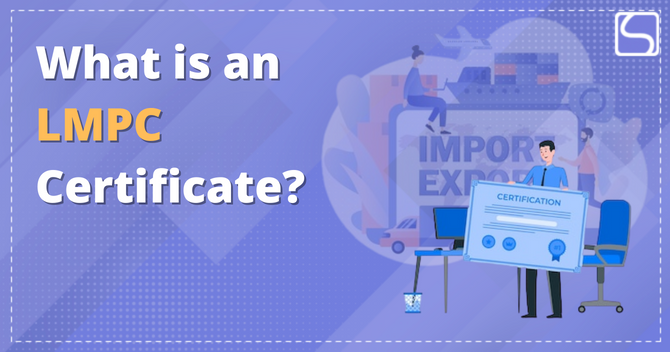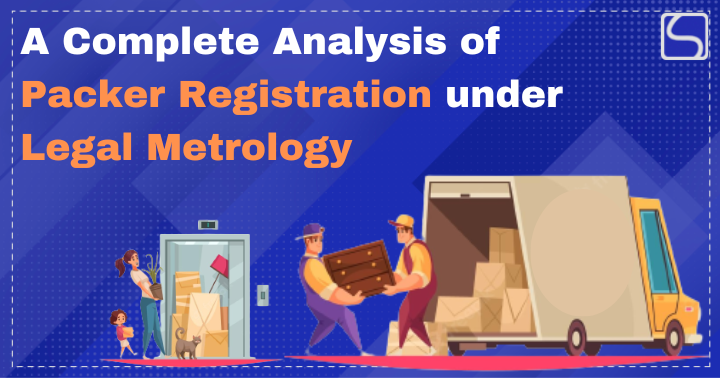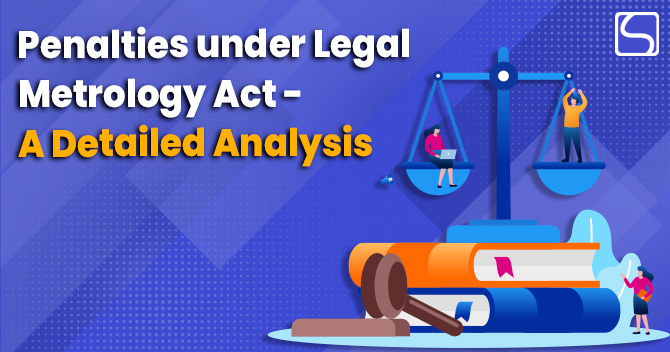What is an LMPC certificate?

Ganesh Nair | Updated: Aug 31, 2022 | Category: Legal Metrology
LMPC stands for Legal metrology packaged commodity certificate. This certificate is necessary to import your goods as per the Legal Metrology Act, 2009 and the Legal metrology rules (packaged commodity), 2011. This act focuses on the goods and commodities that are sold or distributed by way of number, measure or weight. These strict measures are introduced to protect consumer rights and instil fair trade practices. This blog shall focus on the process of obtaining an LMPC certificate.
Table of Contents
Why does one need LMPC registration?
It is mandatory for every importer to get registered as Legal metrology Commodity registration. There are certain declarations that the importer needs to make to the government regarding his consignments. These rules have to be adhered to by a person before importing the goods to India. The directorate General of foreign trade had released notification No. RE-44 of the year 2000. The notification made it mandatory for the customs authority to check whether the importer is following rules and compliances regarding legal metrology or not. If all the required obligations regarding the legal metrology are not fulfilled, then customs authorities have the power to stop the import of the consignment. Hence all the importers need to have the LMPC registration completed.
What are the Different types of LMPC certificates?
There are two types of LMPC certificates according to the provisions of registrations laid down under Legal Metrology Pre-Packed commodity rules 2011; these are:
- LMPC importer registration as per rule 27: if a person imports certain pre-packed goods and commodities in India and plans to sell them without any further packaging or labelling, then he shall have an LMPC importer registration certificate
- LMPC Packer and Manufacturer Registration under rule 27: this type of registration is required by a person who plans to manufacture and package goods that they have imported from a third party and later sell it as their own brand.
What is the LMPC registration process?
The procedure for LMPC registration is laid down in Rule 15 of the Legal metrology rules of 2011. These are:
- The requisite fees which are payable has been mentioned in the twelfth schedule, and the application is mentioned in the tenth schedule of the rules.
- A person can apply for LMPC registration via their state’s online portal. In case the applicant’s state doesn’t have an online portal, he can file the application in person by submitting the necessary documents at the state’s local legal metrology department.
- Manufacturers and vendors must register themselves as an importer with the Director of Legal Metrology, Government of India.
- The application should be submitted to the Director of Legal metrology through the state controller with a fee of Rs.100 one month before the import.
- The controller will forward the application with a report on the prototypes and specifications of the importer.
What is the validity of LMPC certificate registration?
LMPC registration shall be valid for up to a period of 5 years, and this needs to be renewed periodically at the end of five years.
What are the declarations that need to be made for the LMPC certificate?
- Name and address of both the importer and manufacturer
- Generic name of the product to be mentioned on the package
- Commodity’s place of origin
- Net quantity of the commodities in terms of weight, measurement number
- Month and year of the import and manufacture
- Maximum retail price of the product
- Dimensions of the product
- Contact details of the office in case of complaints
What are the Documents Required for an LMPC certificate?
- Importer Exporter Code- as provided by DGFT
- Documents proving the applicant’s date of birth.
- Documents stating the address or identity proof
- Document showing proof of ownership/ rent of the premises
- The model approval was issued Director, Legal Metrology, Government of India[1].
- Partnership deed if the entity is a partnership firm.
- Map of the premises
- Sample of the Label to attached to the community.
- A no-objection certificate is required from the pollution control board.
- A copy of GST/VAT/CST registration.
- A copy of PAN
- Registration documents of the establishment, factory or shop, as the case may be.
Violations and penalties
If any violations are made as per the Legal Metrology (packaged Commodity) Rules, then it shall invite a fine of
- If rules 27-31 are violated, then it shall invite a fine of ₹ 4000
- For any other rules for which the fine has not been specified in the act or rules, the fine shall be ₹ 2,000
- If an importer files for an LMPC certificate after the completion of 90 days from the date of import, then he shall be charged ₹ 5000
- Other actions can be taken besides the fines, especially if it is a recurring offence. Usually, in the case of any violations, the manufacturer is held liable. In case no address or name is mentioned on the consignment, then the address and name preceded by the words manufactured by or packed by shall be held liable.
What goods and commodities are exempted from LMPC Certificate?
LMPC certificate is essential for many pre-packaged goods except for a few, such as:
- All the commodities have a net weight of fewer than 10 grams.
- All commodities that measure less than 10 millimetres.
- Packages that have fast food items packaged by hotel or restaurant
- Packages that have formulations covered by drugs (Price Control) Order,1995
- Agricultural products in packages of more than 50 kg
- As per Chapter 2 of the Legal Metrology Act, which has rules for provisions for the packaged commodity for retail sale, it shall exempt:
- The packages that weigh more than 25 Kg or 25 Litres, however, shall not include cement and fertilisers sold in bags of up to 50 Kg.
- Packages that are for industrial consumers (the goods that have been brought directly from the manufacturer for use in that specific industry, such as railways, hospital hotels etc.)
Conclusion:
LMPC certificate is an essential requirement for any importer who wants to get the pre-packed goods into the country. However, if any person is found violating these guidelines, they shall be liable for the punishments as stipulated under the Legal Metrology Act, 2009. Certain products do not require the LMPC certificate; these are based on the product’s size, quantity or type. Such goods are exempted from this.
Read our Article:How to obtain a Dealer License under Legal Metrology?














